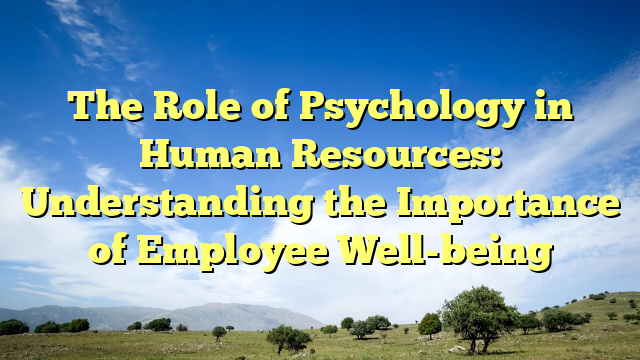The Role of Psychology in Human Resources: Understanding the Importance of Employee Well-being
The Role of Psychology in Human Resources: Understanding the Importance of Employee Well-being
Introduction
Human resources (HR) departments play a crucial role in organizations by managing the most valuable asset – employees. In recent years, there has been a growing recognition of the importance of employee well-being in the workplace. This has led to the integration of psychology into HR practices, as understanding the psychological aspects of employees can significantly impact their well-being and overall performance. This article explores the role of psychology in human resources and highlights the significance of employee well-being.
The Psychological Impact on Employee Well-being
Employee well-being encompasses various aspects, including physical, mental, and emotional health. Psychology helps HR professionals understand the psychological factors that influence employee well-being and how to address them effectively.
One of the key psychological factors that impact employee well-being is stress. High levels of stress can lead to burnout, decreased productivity, and even physical health issues. By understanding the causes and effects of stress, HR professionals can implement strategies to reduce stress levels in the workplace. This may include providing stress management workshops, promoting work-life balance, and creating a supportive work environment.
Another psychological aspect that affects employee well-being is job satisfaction. Job satisfaction refers to the level of contentment an employee feels towards their job. When employees are satisfied with their work, they are more likely to be engaged, motivated, and productive. HR professionals can use psychological assessments and surveys to measure job satisfaction and identify areas for improvement. By addressing these areas, organizations can enhance employee well-being and overall job satisfaction.
The Role of Psychology in Recruitment and Selection
Psychology plays a crucial role in the recruitment and selection process. HR professionals use psychological assessments and tests to evaluate candidates’ suitability for a particular role. These assessments help identify candidates’ personality traits, cognitive abilities, and emotional intelligence, which are essential for job success and overall well-being.
By incorporating psychology into recruitment and selection, HR professionals can ensure that candidates are not only qualified for the job but also a good fit for the organization’s culture and values. This alignment between the candidate and the organization promotes a positive work environment and enhances employee well-being.
The Importance of Psychological Support in the Workplace
Psychological support in the workplace is crucial for maintaining employee well-being. HR professionals can provide various forms of support, including counseling services, employee assistance programs, and mental health resources.
By offering psychological support, organizations demonstrate their commitment to employee well-being and create a culture of care and support. This, in turn, leads to increased job satisfaction, higher levels of engagement, and improved overall performance.
Implementing Psychological Strategies for Employee Well-being
HR professionals can implement various psychological strategies to enhance employee well-being in the workplace. These strategies include:
- Providing regular feedback and recognition
- Promoting work-life balance
- Encouraging open communication and transparency
- Offering opportunities for professional development and growth
- Creating a positive and inclusive work environment
By incorporating these strategies, organizations can foster a psychologically healthy workplace that supports employee well-being and overall satisfaction.
The Benefits of Prioritizing Employee Well-being
Organizations that prioritize employee well-being reap numerous benefits. These include:
- Increased employee engagement and productivity
- Reduced turnover and absenteeism
- Enhanced organizational reputation and employer branding
- Improved customer satisfaction
- Higher levels of innovation and creativity
By investing in employee well-being, organizations create a positive work culture that attracts and retains top talent, leading to long-term success and growth.
Conclusion
The integration of psychology into human resources practices is essential for understanding and addressing the psychological aspects of employee well-being. By recognizing the impact of stress, job satisfaction, and psychological support, HR professionals can implement strategies to enhance employee well-being and overall performance. Prioritizing employee well-being not only benefits individuals but also contributes to the success and growth of organizations.

